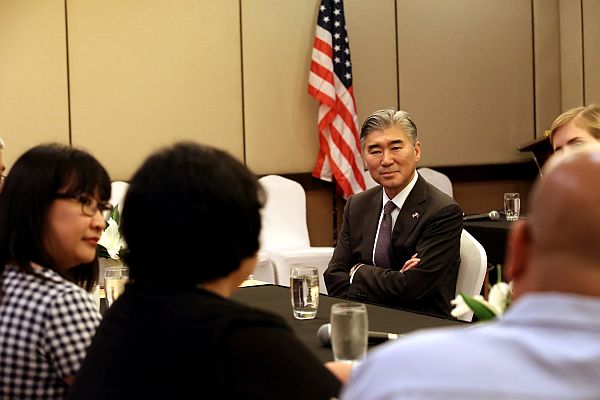BPO industry still thriving despite US policies

US Ambassador to the Philippines Sung Y. Kim discusses issues like the outsourcing industry in the country during a meeting with American Chamber of Commerce members and the Cebu media at the Cebu City Marriott Hotel.
CDN PHOTO/JUNJIE MENDOZA)
US ENVOY in CEBU
US AMBASSADOR to the Philippines Sung Kim said the business process outsourcing (BPO) industry in the country will continue to do well even amid worries that proposed Trump policies will curtail the sector’s growth.
Kim, speaking to members of the American Chamber of Commerce of the Philippines (Amcham) in Cebu on Thursday, said it was still too early to tell what impact US policies on outsourcing have on the local BPO industry since these have not been implemented yet.
“There is no need for unnecessary alarm. US companies continue to enjoy their operations here due to the Philippines’ young, competent, smart, and hardworking population as well as the strong cultural affinity between the two countries,” he said.
To recall, US President Donald Trump said he plans to bring jobs back to America, causing jitters in the Philippines’ outsourcing industry, wherein Americans make up 70 percent of its customer base.
In recent news reports, Philippine Economic Zone Authority (PEZA) Director General Charito Plaza said many American information technology and business process outsourcing (IT-BPO) companies continue to put their expansion plans in the country on hold while waiting for clearer policies from Trump.
She said that this has been the case since January of this year.
However, industry stakeholders remain to be optimistic, with leaders projecting job generation in the sector over the next six years to exceed those created in the previous six years.
Benedict Hernandez, chairman of the Information Technology and Business Process Association of the Philippines (IBPAP), in earlier reports said industry is targeting to create roughly 100,000 new jobs every year or about 650,000 jobs by 2022.
The sector aims for “high value” growth in the next six years with more aggressive expansion outside Metro Manila, said Hernandez.
With strong economic growth and a wide talent pool, outsourcing in the Philippines is expected to grow 1.6 times faster than the global growth rate of six percent during the six-year term of President Rodrigo Duterte.
Kim said that more than “Washington policies,” automation was seen as a threat to the BPO industry not only in the Philippines, but globally.
Industry leaders said players should invest in a workforce with higher value skills as these will be difficult for automation to replace.
The Philippines, with a six-plus percent annual growth over the past six years and a young, productive population, makes for a very interesting market for US companies, said Kim.
He also said that part of their strategy in trying to make growth more inclusive is to look beyond Metro Manila, including Cebu.
“By diversifying the growth base, we hope to expand opportunities for broader economic participation and thus improve the well-being of both urban and rural residents,” he said.
Kim assured members of the Amcham in Cebu that the US will continue to partner with the Philippines and look for ways to increase foreign investment, reduce trade barriers, and streamline business regulations.
Disclaimer: The comments uploaded on this site do not necessarily represent or reflect the views of management and owner of Cebudailynews. We reserve the right to exclude comments that we deem to be inconsistent with our editorial standards.
